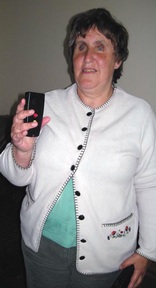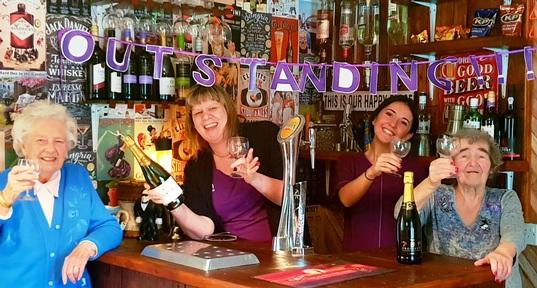Older people with sight loss teach their peers about the benefits of assistive technology
Half of people living in care homes in the UK have sight problems that seriously inhibit their daily lives. Yet there is now remarkable sight loss technology that can make daily life accessible again and give people back their independence. However the problem is making people aware of them and making them feel confident enough to use the gadgets.

The sight loss charity, Thomas Pocklington Trust, runs an innovative scheme where older people with sight loss promote useful gadgets known as assistive technology (AT) to their peers.
The initiative ‘AT Champions’ project uses Assistive Technology Champions, all volunteers with sight loss, to explain AT to people with sight loss in Pocklington’s nine housing schemes and resource centres.
The volunteers have been trained by a specialist sensory rehabilitation worker to find out what people want to be able to do and then identify gadgets that can help and demonstrate those in ways that boost people’s confidence to use them.
“AT can change lives for the better but many people don’t know what’s available,” said Sarah Buchanan, research director for Thomas Pocklington Trust. “Our scheme aims to introduce people with sight loss to the benefits of AT by getting staff, relatives and volunteers who have sight loss to promote, demonstrate and provide trials of some of the amazing products on offer.”
Alan Norton, chief executive of Assist UK, the national network for advice on assistive technology, said: “AT can open up doors in life, creating pathways and independence. Often the missing link is information.”
Assistive Technology ranges from high-tech products such as scanners and audio readers that translate documents into sound, to simple solutions such as tactile and audio labels or one touch can openers.
Pocklington carried out research that found both support staff and older people with sight loss had low awareness of AT products. Older people with sight loss were not aware of what was available, but they were interested in using new things if they felt those could help them in their everyday lives.
Staff were worried that time spent learning about and promoting AT could detract from time needed for personalised care. But in fact, the research showed that promoting the products freed up time as older people with sight loss were able to do more for themselves instead of asking staff to do those things for them.
There is no national policy on eye health in care homes and so many older people do not have the most basic eye care, according to the International Longevity Centre UK. Half of those living in care homes are thought to have some kind of sight loss. Signs that residents may have sight loss include frequent trips and falls, food and drink left untouched and frustration and anger.
Sight loss remains a ‘silent’ problem where many older people assume it is inevitable with age, and irreversible. They live with varying stages of deteriorating sight, unaware of their need for better care and therefore unable to ask for it.
However there are some simple things that care homes can do to help. This includes bringing domiciliary opticians into the home as everyone over 70 should have an eye test every year.
Clear signage in large distinct letters in the care home can be really important, according to Pam Lacy, a research manager at Pocklington “as people with sight loss often find it hard to distinguish between light and dark. A person in their sixties will see 60 per cent less light than a person in their twenties.”
Some eye conditions make colour discrimination more difficult, so increasing the difference in brightness between an object and its background is generally better than using contrasting colours.
It is also crucial to have the right lighting in the care home environment. One resident at a Pocklington housing scheme commented: “I can see the boundaries of the room – I can find my way round now.”
“Eye care is not a minor part of general health - it is a crucial priority, vital to people’s health, wellbeing and independence,” said Ms Buchanan. She would like to see care home staff and managers being trained in issues of sight loss and eye health.
Information about Pocklington's AT Champions initiative is available from: Michelle Baxter-Wickham, volunteer services manager, michelle.bwickham@pocklington-trust.org.uk
"Assistive Technology, a Guide to Assistive Technology in the Home", Good Practice Guide 6, is available at www.pocklington-trust.co.uk /research/publications/gpg6.htm
Information about Pocklington's research is available from: research@pocklington-trust.org.uk
Latest Innovative Care News
 13-May-19
'Pink drink' brain cancer treatment rolled out across NHS in memory of Baroness Jowell
13-May-19
'Pink drink' brain cancer treatment rolled out across NHS in memory of Baroness Jowell
 25-Apr-19
Louis Tomlinson helps 83-year-old who lost wife to dementia complete bucket list
25-Apr-19
Louis Tomlinson helps 83-year-old who lost wife to dementia complete bucket list
 22-Mar-19
UK's top care home handyman takes residents to pub for pie and pint
22-Mar-19
UK's top care home handyman takes residents to pub for pie and pint
 12-Feb-19
Michael McIntyre's jokes tested to see if they stop elderly catching flu
12-Feb-19
Michael McIntyre's jokes tested to see if they stop elderly catching flu
 07-Jan-19
'We were lucky to find it': Family's delight as care home is rated Outstanding
07-Jan-19
'We were lucky to find it': Family's delight as care home is rated Outstanding